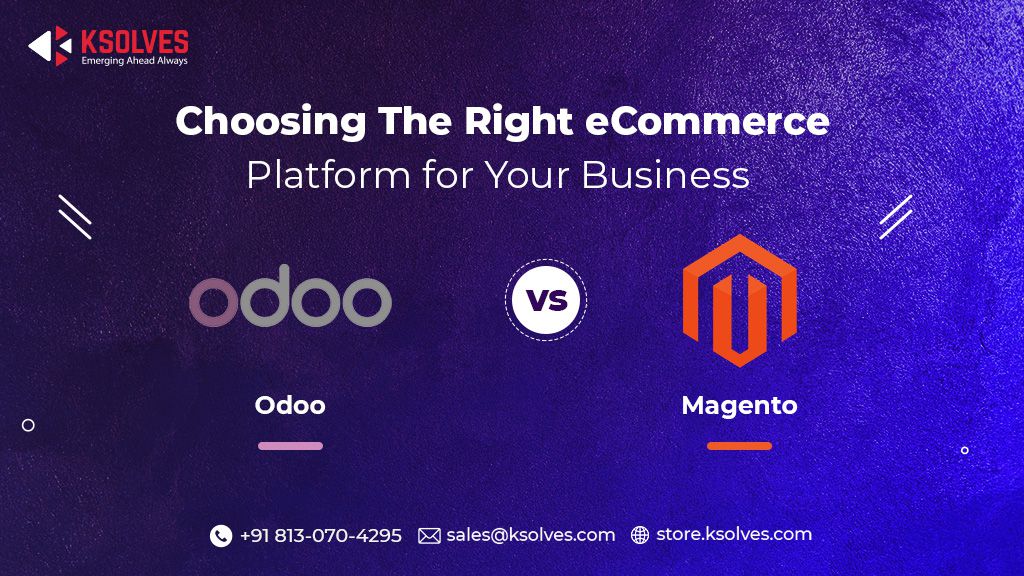Odoo
5 MIN READ
September 23, 2021
![]()

The ease with which people may buy products online has overtaken the traditional trade involving brick-and-mortar establishments. The number of people who opt to shop on the internet rather than in actual stores has risen dramatically in recent years. Choosing the finest eCommerce software involves many considerations such as functionality, scalability, user-friendliness, pricing, and so on. In this space, we will discuss Odoo vs Magento, in terms of the benefits they offer.
Magento is definitely the king of e-commerce platforms with excellent & functional design to lure customers. The introduction of Magento 2 has made it way more superior. However, there are always new entrants in the market that try to challenge the hegemony and Odoo ERP is one of them. While Magento and some other e-commerce platforms have mostly focused on the front end, Odoo has a unified business administration system for managing online storefronts.
Odoo is so self-sufficient that it eliminates the need for any standalone business software to manage customers, sales, purchases, inventory, marketing, and much more. Regardless of the size or complexity of any business, Odoo provides a totalitarian and simple management system for all business processes. As a result, e-commerce companies implementing Odoo will have a strong backend procedure.
When it comes to scalability, both Magento and Odoo are great.
There are community & cloud versions of both. Odoo includes a user-friendly interface and a number of useful features, such as simple configuration, integration, and robust customization options.
It’s a consolidated platform with a modular strategy.
When it comes to Magento, it is probably the most powerful eCommerce system and focuses on SEO-friendliness. In addition to that, it is a powerful CMS. It also has a large helpful community of enthusiastic developers who are always adding new functionalities & extensions to accommodate various eCommerce requirements.
Odoo is a fantastic place to start for small and medium enterprises because it not only provides a simple approach to handle all business processes, but it also offers a solid back-end process.
If you use Odoo, managing accounting, inventories, purchases, CRM, and other business functions from a single platform is very much possible utilizing a variety of Odoo apps.
Magento, on the other hand, offers an advanced backend. However, it is just for activities related to eCommerce like catalog & order management, consumer management, etc. So you’ll have to invest in Magento extensions if you wish to handle your inventory, book-keeping, or purchases. However, one great thing is that the Magento developers community is pretty active and continuously comes up with useful extensions.
Setting up Odoo is very easy. It does not require a lot of technical knowledge. Moreover, there are various apps in the Odoo store that can improve the eCommerce storefront without the need to hire a professional to align it.
While Magento may necessitate hiring IT professionals for setup and implementation, it is worth the effort. Magento has an advantage over Odoo because there are numerous qualified Magento developers. If you require expert assistance with the setup of your Magento store. Additionally, Magento has a sizable extension development community. As a result, you may use Magento extensions to add any feature to the online store.
Redirect Payment Gateway and PayPal are available with both the platforms but server to server payment gateway is available only on Odoo for now. Odoo can also manage recurring payments. Magento offers a secure and safe payment gateway for the buyer as well as the seller. Both platforms provide multi-currency options to facilitate sales in different geographies. Each of the platforms supports almost all payment gateway solutions. But since Magento is the more mature and popular platform, most payment gateways have ready-made integrations for Magento.
Any e-commerce needs to generate detailed reports that facilitate business growth. Both Odoo & Magento can create accurate sales reports(product performance, inventory, sales summary, etc). While Odoo also facilitates Subscription KPIs, Magento comes with a Site search report which you can’t find in Odoo.
Odoo & Magento are popular e-commerce platforms that are supported by their respective communities. Is it really necessary to choose between Odoo and Magento? Another alternative is to combine Odoo and Magento into a single outstanding solution for managing your online business. An experienced developer can easily blend the two to provide you with the best benefits of both worlds. The experts from Ksolves can provide you the best consultancy on this and any other queries you may have regarding Magento and Odoo. Connect with us to learn more!
Email: sales@ksolves.com
Call : +91 8130704295
![]()